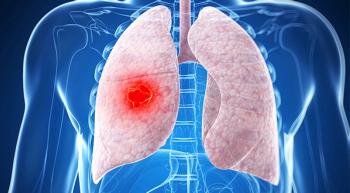
Chronic graft-versus-host disease management has continued to advance in recent years, with new and anticipated treatment options for its treatment landscape.

Chronic graft-versus-host disease management has continued to advance in recent years, with new and anticipated treatment options for its treatment landscape.

Kelly Garvin, BSN, RN, OCN, discusses the impact of CAR T-cell therapy on patients and how nurses care for them, as well as her expectations on how indications will grow.

Kelly L. Garvin, BSN, RN, OCN, discusses what changes she hopes to see in CAR T-Cell therapy treatment over the coming years.

Patients with non-small cell lung cancer driver mutations respond better to targeted treatments compared to chemotherapy, yet less than half of these patients receive next generation sequencing.

The continued development of KRAS G12C inhibitors for the treatment of non-small cell lung cancer shows that researchers are making breakthroughs in the treatment landscape.

“If you're an oncology nurse, you will have patients with immunotherapy–which is why we want to make sure that we are really familiar with these side effects.”

Although the use of CAR T-cell therapies are associated with potentially serious adverse events, the treatment provides patients whose disease has failed to respond to previous treatments with hope, according to Kelly Garvin, BSN, RN, OCN.

Recently approved combination therapies have contributed to significantly improved survival rates in renal cell carcinoma.

Proper training can help oncology nurses act as intensivists and quickly identify if their patients are experiencing any CAR T-cell therapy-related adverse events.

“We want to make sure we can provide the right treatment for the right patient at the right time,” says Olufunmilayo I. Olopade, MD, FACP, OON.

With a newfound abundance of available oral cancer therapies, it has become necessary for oncology nurses to ensure that their patients are adhering to treatment.

Teresa Knoop, MSN, RN, AOCN, says it is important for oncology nurses to understand the naming convention of biosimilars as it is an important aspect of anticipating adverse events.

Beth Sandy, MSN, CRNP, OCN, says that she would like to see 95% of eligible patients receive biomarker testing in the next 5 to 10 years.

Preliminary study results recently presented at the 2021 European Association of Urology Congress demonstrate that the safety profile of the combination of Bacillus Calmette-Guérin (BCG) and mitomycin is comparable to BCG alone.

ASCO updated its guidelines following a presentation of the OlympiA trial presented at its 2021 Annual Meeting.

A presentation at the 2021 American Society of Clinical Oncology Meeting demonstrated that the use of electronic patient-reported outcomes in community oncology centers improved symptom-management.

Data from the phase 3 JUPITER-02 trial (NCT03581786) suggests that frontline toripalimab plus gemcitabine/cisplatin improves progression-free survival (PFS).

Survival outcomes in the frontline treatment of patients with unresectable advanced or metastatic esophageal squamous cell carcinoma were improved when nivolumab was added alongside either ipilimumab or chemotherapy.

A Texas study revealed that the implementation of electronic patient management solutions resulted in reduced call back times for symptom-related calls as well as reduced hospitalizations.

KRAS mutational status and geographical region were associated with time on treatment (TOT), and body mass index (BMI) and age were linked with overall survival (OS) in patients with metastatic colorectal cancer mCRC) being treated with second-line cetuximab (Erbitux) after irinotecan or oxaliplatin-based regimens.

Cabozantinib exposure was not a predictor of progression-free survival was related to high rate of palmar-plantar plantar erythrodysesthesia and diarrhea in patients with advanced renal cell carcinoma.

This year, there were many takeaways from the American Society of Clinical Oncology Annual Meeting that oncology nurses can incorporate into their practice.

Learn how to approach palliative care discussions with both physicians and patients.

Men with asymptomatic or mildly symptomatic metastatic castration-resistant prostate cancer who are being treated with radium-223 (Xofigo) plus enzalutamide (Xtandi) can reduce their risk of fractures with the use of bone-protecting agents.

The second-generation 4-1BB bi-specific CAR T-cell therapy was efficacious and safe in treating patients with relapsed/refractory B-cell non-Hodgkin lymphoma.

Sacituzumab govitecan, an antibody drug conjugate, maintained survival and response benefits over chemotherapy regimens.

Survival rates were similar between the 2 drugs, but acalabrutinib had fewer adverse events.

Nivolumab with or without ipilimumab improved survival over ipilimumab alone in patients with previously untreated advanced melanoma.

Previously treated patients with non-small cell lung cancer tended to have better responses with Retevmo than they did with prior treatments.

Adjuvant carboplatin and paclitaxel after standard cisplatin-based chemoradiation did not demonstrate improved overall survival or progression-free survival in patients with locally advanced cervical cancer.